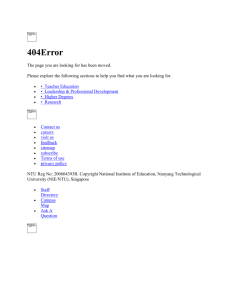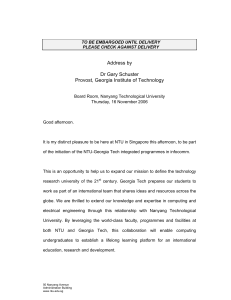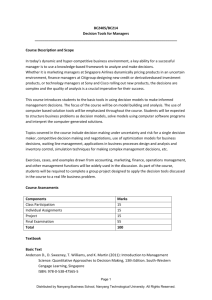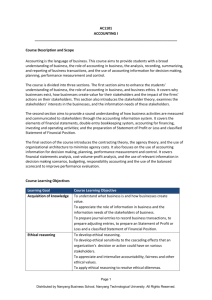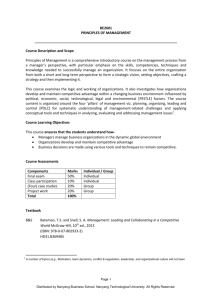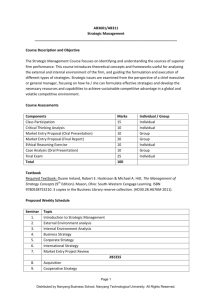Nanyang Technological University
advertisement
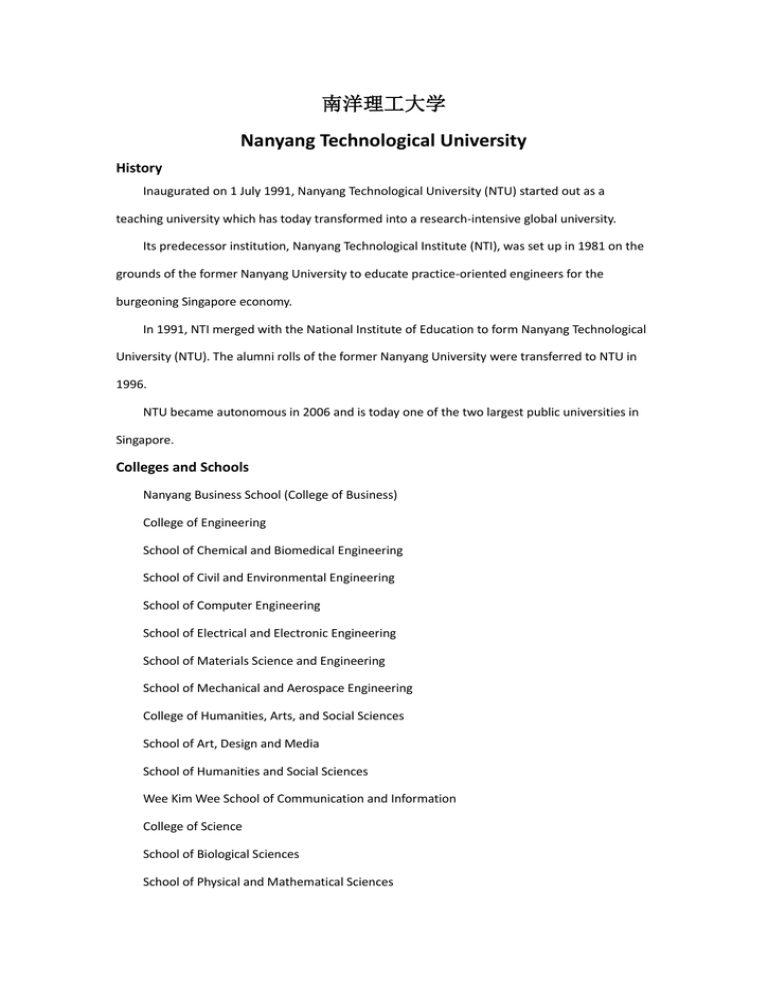
南洋理工大学 Nanyang Technological University History Inaugurated on 1 July 1991, Nanyang Technological University (NTU) started out as a teaching university which has today transformed into a research-intensive global university. Its predecessor institution, Nanyang Technological Institute (NTI), was set up in 1981 on the grounds of the former Nanyang University to educate practice-oriented engineers for the burgeoning Singapore economy. In 1991, NTI merged with the National Institute of Education to form Nanyang Technological University (NTU). The alumni rolls of the former Nanyang University were transferred to NTU in 1996. NTU became autonomous in 2006 and is today one of the two largest public universities in Singapore. Colleges and Schools Nanyang Business School (College of Business) College of Engineering School of Chemical and Biomedical Engineering School of Civil and Environmental Engineering School of Computer Engineering School of Electrical and Electronic Engineering School of Materials Science and Engineering School of Mechanical and Aerospace Engineering College of Humanities, Arts, and Social Sciences School of Art, Design and Media School of Humanities and Social Sciences Wee Kim Wee School of Communication and Information College of Science School of Biological Sciences School of Physical and Mathematical Sciences Lee Kong Chian School of Medicine (LKCMedicine) Interdisciplinary Graduate School (IGS) Autonomous Institute Earth Observatory of Singapore National Institute of Education S. Rajaratnam School of International Studies Singapore Centre on Environmental Life Sciences Engineering Other Institutes and Centres Institute on Asian Consumer Insight Confucius Institute Cornell-Nanyang Institute of Hospitality Management Energy Research Institute @ NTU Institute of Advanced Studies Institute for Media Innovation Institute for Sports Research Nanyang Environment and Water Research Institute Nanyang Technopreneurship Center Nanyang Centre for Public Administration Singapore Centre for Chinese Language Nanyang Institute of Technology in Health and Medicine SAF-NTU Academy World University Rankings NTU jumps in world university rankings for third straight year. For the third consecutive year, Nanyang Technological University (NTU) has made big strides in world university rankings. It is now placed No. 41 in the world and is the fastest-rising Asian university in the Top 50. In the rankings of the world’s top 400 universities released by Quacquarelli Symonds (QS) today, NTU climbed 6 spots from 47th place last year, improving its scores in faculty citations, reputation among international employers, and student faculty ratio. In total, NTU has moved up 33 notches in the QS world rankings over the last three years, reaffirming its standing as the fastest rising Asian university in the world’s Top 50. NTU is one of only two young global universities in the Top 50. NTU broke into the world’s Top 50 when it rose by 11 places to No. 47 last year. In 2011, it climbed 16 positions from 74th to 58th place. NTU subjects in the Top 10: Communication & Media Studies: 6th in the world, 1st in Asia. Materials Sciences: 8th in the world, 2nd in Asia. Electrical Engineering: 10th position in the world, 2nd in Asia NTU subjects in the Top 10: NTU Engineering disciplines are all within the top 25: Mechanical Engineering, 12th in the world, 3rd in Asia; Civil Engineering, 21st in the world, 8th in Asia; Computer Science, 21st in the world, 6th in Asia; Chemical Engineering, 25th position in the world, 7th in Asia. NTU subjects in the Top 50: Accounting & Finance: 28th in the world, 6th in Asia. Statistics & Operational Research: 30th in the world, 6th in Asia. Politics & International Studies: Increased by 20 positions to 35th position in the world, 9th in Asia. English Language & Literature: Increased by 38 positions to 46th position in the world, 2nd in Asia. NTU’s rankings for Psychology, Linguistics, Environmental Sciences, Mathematics, Sociology, Economics & Econometrics, Law, Chemistry, Physics & Astronomy, Biological Sciences and Modern Languages range from 4th to 24th position in Asia. Web site http://www.ntu.edu.sg
